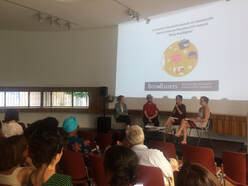
Belgium put sexual and reproductive rights in the spotlight during the ‘European Sustainability Week’ in Berlin, June 2019. Sensoa participated in a panel with Moroccan documentary maker Mohammed Nabil and human rights activist Katrin Erlingsen of the NGO Deutsche Stiftung Weltvölkerung (DSW) at the Belgian Embassy in Berlin.
‘Jewels of grief’, a touching documentary about the faith of single mothers in Morocco served as an introduction to an exchange on women’s rights worldwide and the opposition they face.
Uneducated single mothers risk societal exclusion. They cannot find decent work and have difficulties providing for their children. Girls’ access to education is key to girls and women’s sexual and reproductive health and rights. The longer a girl stays at school, the higher the chances she will marry later, use modern contraceptives and have her first child at a later age. Every additional year of school increases a girl’s income in later life and decreases the chance her child will die before the age of 1. Only 2 in 3 girls in low income countries finish primary school though. Only 1 in 3 finishes lower secundary school.
The documentary demonstrated the lack of attention for the sexuality and sexual health of young people. In Morocco, as in many other countries around the world, premarital sex remains a societal taboo. Yet, as people are marrying at a later age, the number of young people who are sexually active before marriage is increasing. The stigma around young people’s sexuality leads to ill-informed and unsafe sex and unplanned pregnancies. Young women who get pregnant risk being expelled from their families and encounter prejudice and discrimination by health care providers, reinforcing the health risks and social exclusion.
Sensoa explained the importance of sexual and reproductive health and rights (SRHR) for the realisation of the 2030 Agenda for Sustainable Development. To improve the SRHR knowledge and skills of stakeholders of the Belgian development cooperation, Sensoa was commissioned by the Institute of Tropical Medicine and the SRHR WG of Be-cause health to develop the e-tutorial Body&Rights. The e-tutorial received a warm welcome by the audience in Berlin.
Uneducated single mothers risk societal exclusion. They cannot find decent work and have difficulties providing for their children. Girls’ access to education is key to girls and women’s sexual and reproductive health and rights. The longer a girl stays at school, the higher the chances she will marry later, use modern contraceptives and have her first child at a later age. Every additional year of school increases a girl’s income in later life and decreases the chance her child will die before the age of 1. Only 2 in 3 girls in low income countries finish primary school though. Only 1 in 3 finishes lower secundary school.
The documentary demonstrated the lack of attention for the sexuality and sexual health of young people. In Morocco, as in many other countries around the world, premarital sex remains a societal taboo. Yet, as people are marrying at a later age, the number of young people who are sexually active before marriage is increasing. The stigma around young people’s sexuality leads to ill-informed and unsafe sex and unplanned pregnancies. Young women who get pregnant risk being expelled from their families and encounter prejudice and discrimination by health care providers, reinforcing the health risks and social exclusion.
Sensoa explained the importance of sexual and reproductive health and rights (SRHR) for the realisation of the 2030 Agenda for Sustainable Development. To improve the SRHR knowledge and skills of stakeholders of the Belgian development cooperation, Sensoa was commissioned by the Institute of Tropical Medicine and the SRHR WG of Be-cause health to develop the e-tutorial Body&Rights. The e-tutorial received a warm welcome by the audience in Berlin.

 RSS Feed
RSS Feed